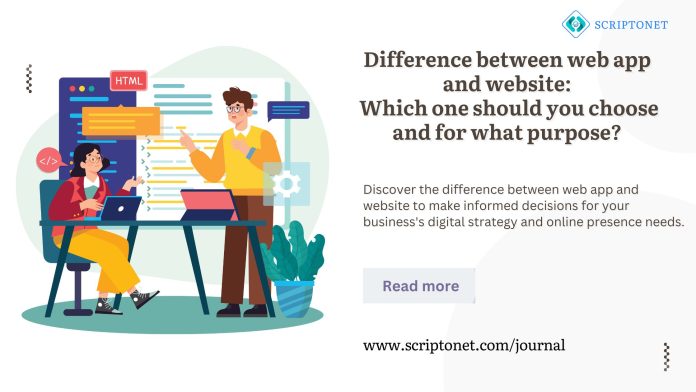Introduction
The digital world offers countless ways for companies to build their online presence. Modern businesses face numerous opportunities to establish a digital presence. Today’s digital marketplace offers numerous options for establishing an online presence.
Understanding the difference between web app and website becomes crucial when making strategic decisions about your digital platform. This guide explores the fundamental distinctions between web apps & websites.
Let’s examine their distinct qualities, benefits, and drawbacks so you can decide on the best course of action for your company’s requirements.
What is a website?
A website serves as a digital brochure or information hub for businesses & organizations. It primarily displays static content that visitors can read, view or download. Traditional websites focus on presenting information rather than enabling complex user interactions. They typically include pages like Home, About us, Services, Contact & Blog sections.
Most websites operate on a simple request-response model. When users click a link or enter a URL, the server sends back HTML pages that browsers display. This straightforward approach makes websites ideal for businesses that need online visibility without complex functionality.
Common examples include corporate websites, blogs, news portals & portfolio sites. These platforms excel at sharing information, building brand awareness & providing contact details to potential customers.
What is a web app?
A web app functions like software that runs in your browser instead of being installed on your device. It allows users to digest data, carry out particular tasks, and engage with dynamic information. Web apps react to users & meet their needs. They need logins, save data & adjust based on how people use them. These apps respond to user actions & deliver what’s needed. They need sign-ups, keep data & change based on usage.
The interactive aspect of web apps is their main advantage. Users can manipulate data, complete transactions, collaborate with others & access personalized dashboards. This makes them a necessary tool for businesses that need to engage users actively.
Popular examples include Gmail, Google Docs, online banking platforms & social media sites. These applications allow users to create, manipulate & share content while providing real-time updates & notifications.
Key differences in functionality
The difference between web app and website becomes most apparent when examining their core functionality. Websites primarily serve content while web apps process user input & provide dynamic responses.
Websites usually just allow for simple searches, form submissions, and navigation. Users consume information but cannot manipulate or transform it significantly.
Web apps enable complex interactions like entering new data, uploading files, real-time collaboration & automated workflows. They often integrate with external services, APIs & databases to provide comprehensive functionality.
Consider an online store: a website might display product catalogs & company information, while a web app would handle shopping carts, payment processing, inventory management & customer accounts.
User Experience (UX) & interaction
User experience differs dramatically between websites & web apps. The difference between web app and website becomes evident in how users engage with each platform.
Websites provide a passive browsing experience. Users navigate through pages, read content & might fill out contact forms. The interaction remains relatively simple & straightforward.
Web apps demand active user participation. They require users to input data, make decisions & perform actions that affect their experience. This engagement creates a more personalized & dynamic environment.
Loading times also vary significantly. Websites typically load faster initially but require full page refreshes for navigation. Web apps might take longer to load initially but then provide smoother transitions & real-time updates without page reloads.
Technical architecture & development
The technical basis highlights yet another significant distinction between a website and a web application. Comprehending these differences aids companies in selecting the best development strategy.
Websites often use simpler technologies like HTML, CSS & basic JavaScript. They might integrate with content management systems but generally require less complex backend infrastructure.
Web apps demand sophisticated architectures with robust backend systems, databases & server-side processing. They often employ frameworks like React, Angular or Vue.js for frontend development & require extensive API integration.
Development timelines & costs reflect these technical differences. Websites typically launch faster & cost less to develop, while web apps require more time, resources & ongoing maintenance.
Security considerations also differ significantly. Websites primarily need basic security measures, while web apps require comprehensive security protocols to protect user data & prevent unauthorized access.
Performance & scalability
Performance characteristics highlight another significant difference between web app and website. Each platform faces unique challenges in delivering optimal user experiences.
Websites generally load quickly & perform well under normal traffic conditions. Their static nature means they require fewer server resources & can leverage content delivery networks effectively.
Web apps face more complex performance challenges due to their dynamic nature. They must handle real-time data processing, user sessions & complex business logic while maintaining responsive interfaces.
Scalability requirements also differ substantially. Websites might need to handle traffic spikes during promotional campaigns, while web apps must scale to accommodate growing user bases, increasing data volumes & expanding functionality.
Cost considerations & budget planning
Budget planning reveals practical differences when comparing web apps versus websites. The difference between web app and website significantly impacts development & maintenance costs.
Initial development costs for websites remain relatively low. Simple websites can launch within weeks using templates or basic custom development.Because web apps have lower requirements than complex websites, web apps are usually more expensive.
Complex functionality requires experienced developers, extended development timelines & comprehensive quality assurance protocols.
Ongoing maintenance costs also vary considerably. Websites need periodic content updates, security patches & occasional redesigns. Without ongoing care, they quickly become slow & outdated, driving users away. This continuous cycle of maintenance & enhancement is essential for survival in today’s digital market.
Maintenance & updates
Long-term maintenance requirements showcase another important difference between web app and website. Each platform demands different approaches to keeping content fresh & functionality working properly.
Website maintenance typically involves content updates, security patches & occasional design refreshes. Many websites can operate successfully with minimal ongoing technical maintenance once launched.
Web apps require continuous attention to remain functional & secure. They need regular updates to address security vulnerabilities, compatibility issues & user feedback. Database maintenance, performance optimization & feature additions become ongoing responsibilities.
The complexity of updates also differs significantly. Web app updates might require developer intervention, testing & careful deployment to avoid disrupting user experiences.
Making the right choice for your business
The choice between a web app and website depends on your business objectives, target audience & available development resources. Consider a website if your primary goal involves sharing information, building brand awareness or providing basic contact functionality. Websites work well for businesses that need an online presence without complex user interactions.
Choose a web app when your business model requires user engagement, data processing or specialized functionality. Service-based businesses, e-commerce platforms & collaborative tools typically benefit from web app development.
Budget constraints & timeline requirements also influence this decision. Websites offer faster time-to-market & lower initial costs, while web apps require patience & substantial investment to realize their full potential.
Hybrid approaches & modern solutions
Progressive web apps (PWAs) combine the best aspects of both platforms, creating hybrid solutions that offer website simplicity with app-like functionality.
These hybrid approaches allow businesses to start with basic website functionality & gradually add interactive features as their needs evolve. This strategy reduces initial costs while providing a clear upgrade path.
Understanding the difference between web app and website helps businesses recognize when hybrid solutions might serve their needs better than choosing one platform exclusively.
Conclusion
The difference between web app and website extends beyond technical specifications to encompass user experience, business objectives & long-term strategy. Websites excel at content delivery & information sharing, while web apps provide interactive functionality & personalized experiences.
Your choice should align with your business goals, target audience needs & available resources. Consider starting with a website if you need immediate online presence, then evolving toward web app functionality as your requirements become more complex.
Key Takeaways
- Understanding the difference between web app and website empowers better decision-making for your digital strategy. Websites serve information effectively while web apps enable complex interactions & functionality.
- Budget, timeline & business objectives should guide your platform choice. Remember that modern solutions often combine elements of both approaches, providing flexibility as your needs evolve.
- Technical complexity, maintenance requirements & user expectations vary significantly between platforms. Plan accordingly to ensure your chosen solution supports your long-term business success.
Frequently Asked Questions (FAQ)
Can a website function as a web app?
Yes, modern websites can incorporate web app features through progressive enhancement. Many platforms start as simple websites & gradually add interactive elements like user accounts, dynamic content & real-time features to bridge the gap between traditional websites & full web applications.
Which costs more to develop, a web app or a website?
The difference between web app and website development costs stems from complexity, required features & ongoing maintenance needs. Websites can launch with basic functionality, while web apps require comprehensive planning, database integration & extensive testing. Typically, a web app is costlier to build when compared to a website.
How do I know if my business needs a web app or website?
Evaluate your business objectives & user needs. Choose a website if you primarily share information, showcase products or provide contact details. Select a web app if users need to perform tasks, access personalized content or interact with your business through complex workflows.
Can I create a website first and then switch to a web application later?
Absolutely. Many successful businesses begin with informational websites & evolve into web apps as their needs grow. This approach allows you to establish an online presence quickly while planning for future functionality. Understanding the difference between web app and website helps you prepare for this transition effectively.


